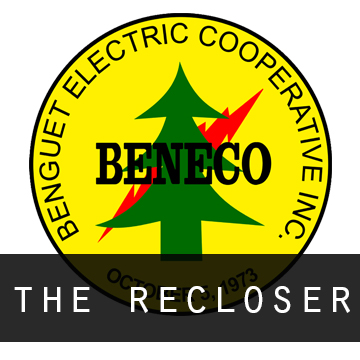

THE RECLOSER
Breaking down the rates
One misconception we in BENECO have to grapple with is the belief that the electric cooperative goes home with the chunk of the payments made by consumers on the items listed in the unbundled bill.
No, Jose. That's not how it is. BENECO only actually retains a fraction of the total amount per kilowatt (kWh). Using the rates in July, BENECO only gets 17.01% thereof. The share comes from the distribution, supply and metering (DSM) charges which BENECO obtains to defray its operational expenditures. That's all.
There are still those who believe that BENECO makes a lot of money. For some, the accusing finger goes up to notoriously believing that the electric cooperative is tremendously enriching itself. Blame it on the perception that BENECO gets all the monies listed in the bill. And with the news that power rates were up in June, all the more that the EC will be taken to task as laughing its way to the bank. Well, that's more of an illusion. It doesn't add up that way.
In July, the EC charged its customers P7.99 per kilowatt hour (kWh). A residential consumer who uses 100 kWh must then pay P799.00. Out of the amount, the EC only takes 17.01% or P135.83 only.
Where do the rest of the money go? Generation (52.86%); Transmission (9.04%); System Loss (5.30%); Lifeline Rate Subsidy (0.91%); Feed In Tariff Allowance (0.61%); Reinvestment Fund for Sustainable Capital Expenditure - REFC (22.70%); Senior Citizen Subsidy (0.01%); Universal Charge (2.47%); and Value Added Tax (10.09%).
Admittedly, the generation charge gets the biggest slice of the pie. The other charges are imposed by the government. The Electric Power Industry Reform Act (EPIRA) or RA 9136 allows their collection.
Our member consumer owners (MCOs) must get accustomed to these facts. They indeed pay a lot of items in the bill but to reiterate, the EC only takes a fraction thereof. Of course, aside from the DSM charges, the EC also keeps custody of one line in the unbundled power bill - the Reinvestment Fund for Sustainable Capital Expenditure or REFC. But the amount is used to pay the EC's amortizations on loans it took to upgrade, expand, repair, rehabilitate and install equipment and systems designed to improve the distribution system of the EC.
The REFC cost is a must, meaning, all ECs have to go through an RFSC since the trend for distribution utilities today is to continuously go high tech.
One might be tempted to ask - Why the need to loan from the bank? ECs have to since being non-stock and non-profit, they have no capital to secure modern machines or equipment or purchase the latest system technology. How come? Because ECS are not allowed by law to gain profit. The rate methodology they employ - cash flow methodology - allow the ECs to recover only the cost of their capital expenditure and the cost of maintaining labor, office supplies and fuel for service vehicles.
"Sure ka?" Yes.
The amount of power BENECO buys from Team Energy, its power supplier, at P3.85 per kWh hour, is passed on to the consumers together with the adjustments in dollar rate and fuel costs. BENECO cannot add even a single centavo as margin or risk being issued a show cause order from the Energy Regulatory Commission (ERC).
In other words, the ECs, like BENECO, are not profit driven just like the ordinary business or private company. ECs are there for service - deliver reliable and least cost electricity. That's why they are called non-stock, non-profit rural electric cooperatives in the first place.
Read the provisions of Presidential Decree No. 269. The mandate of ECs is clearly defined. Nowhere in the law can we find that the ECs are allowed an ROI or return on investment.
The ECs are burdened with the task of being the collection agent of Pass Through charges. Not all MCOs and private and public institutions know that. Add to the equation the state imposed fees - universal charges, FIT-Allowance, stranded debts and stranded contract costs - and the ECs, in their bid to collect these charges, will naturally emerge before the eyes of the republic of electricity consumers as anti-heroes or kontrabida in the vernacular.
We can only parry the charges, patiently. Part of our approach is a massive information, education and communication campaign (IEC) but we admit we could not reach every ear and every household. This will always be a challenge for us.
Our consumers indeed pay a lot of items in their monthly bills. But not all of them are taken by the ECs. The ECs just take a nip of them to survive.
4 South Drive
Baguio City 2600